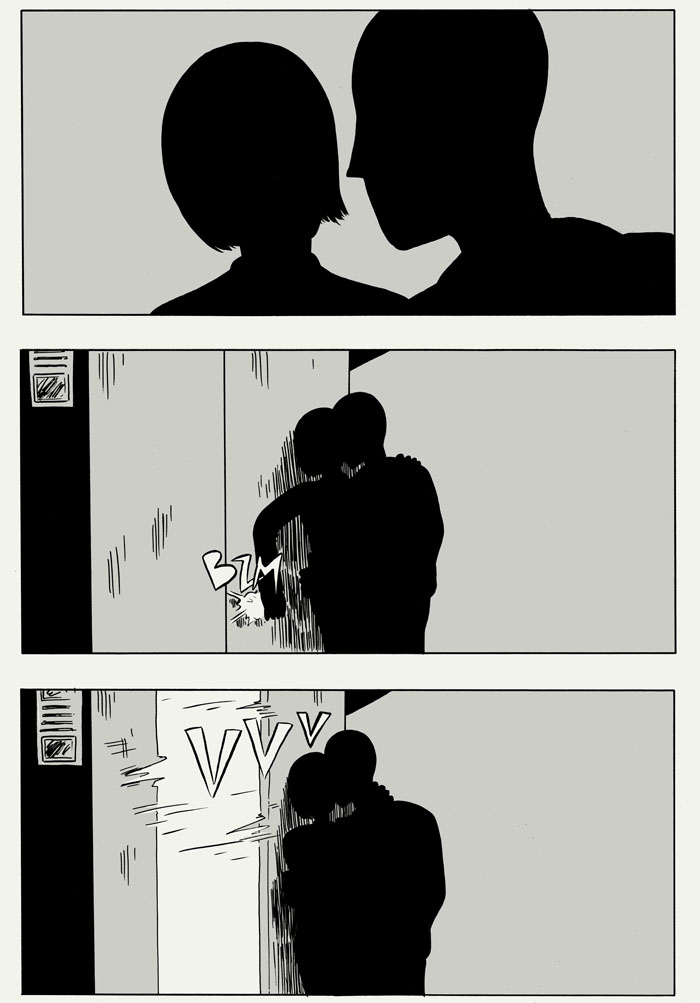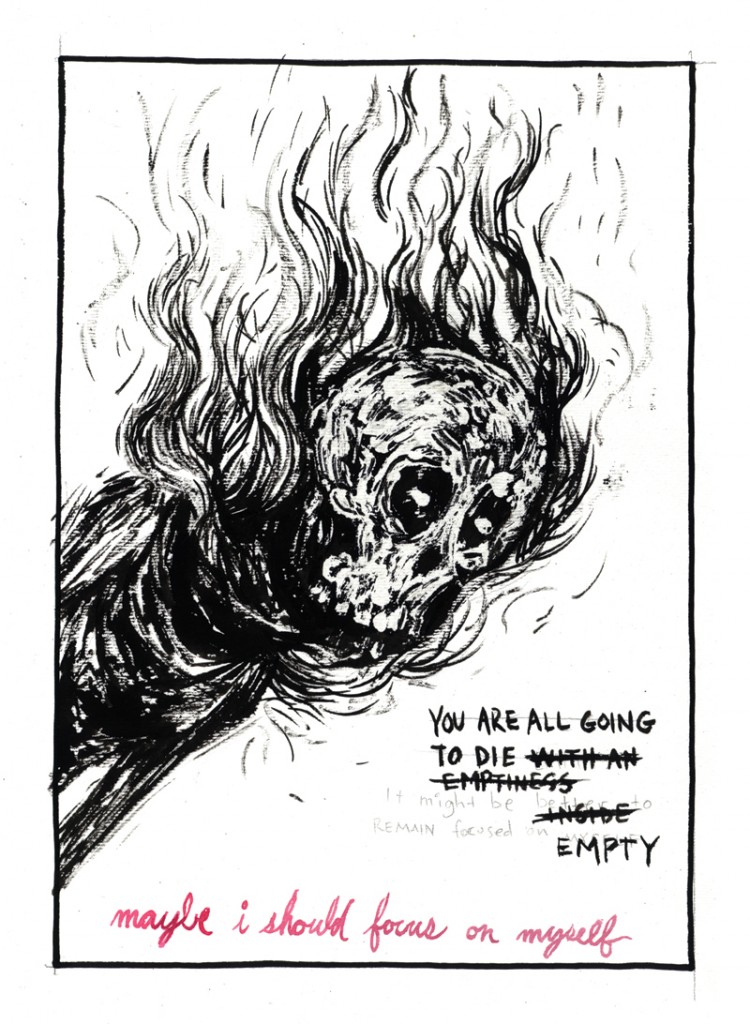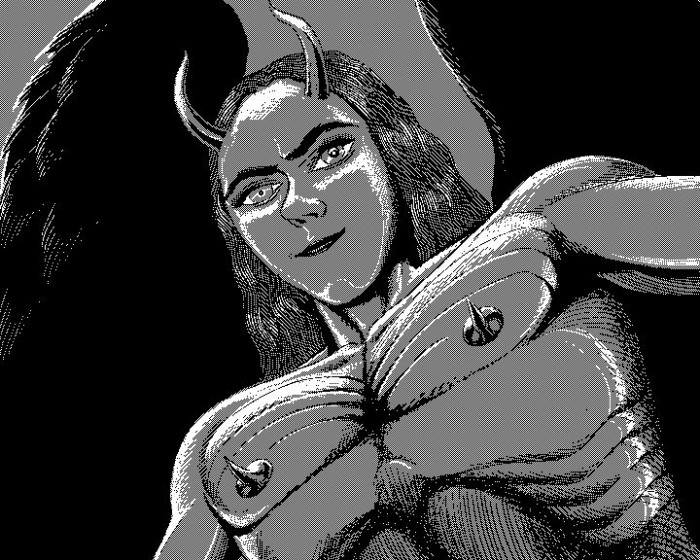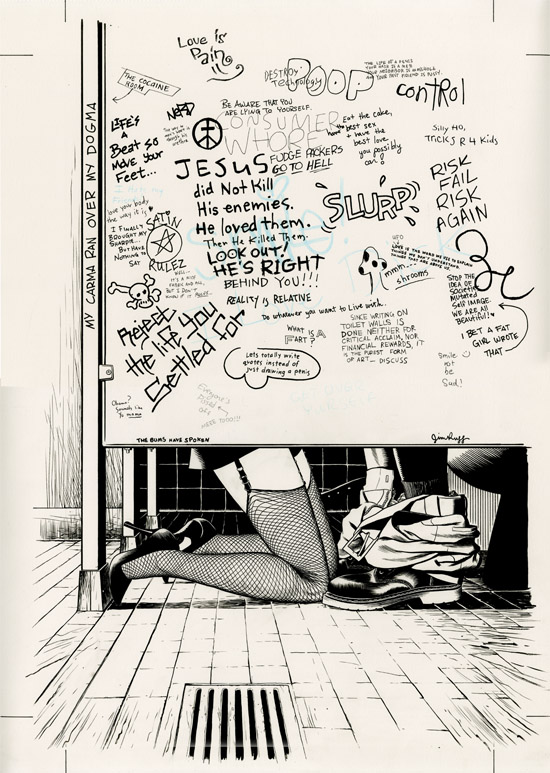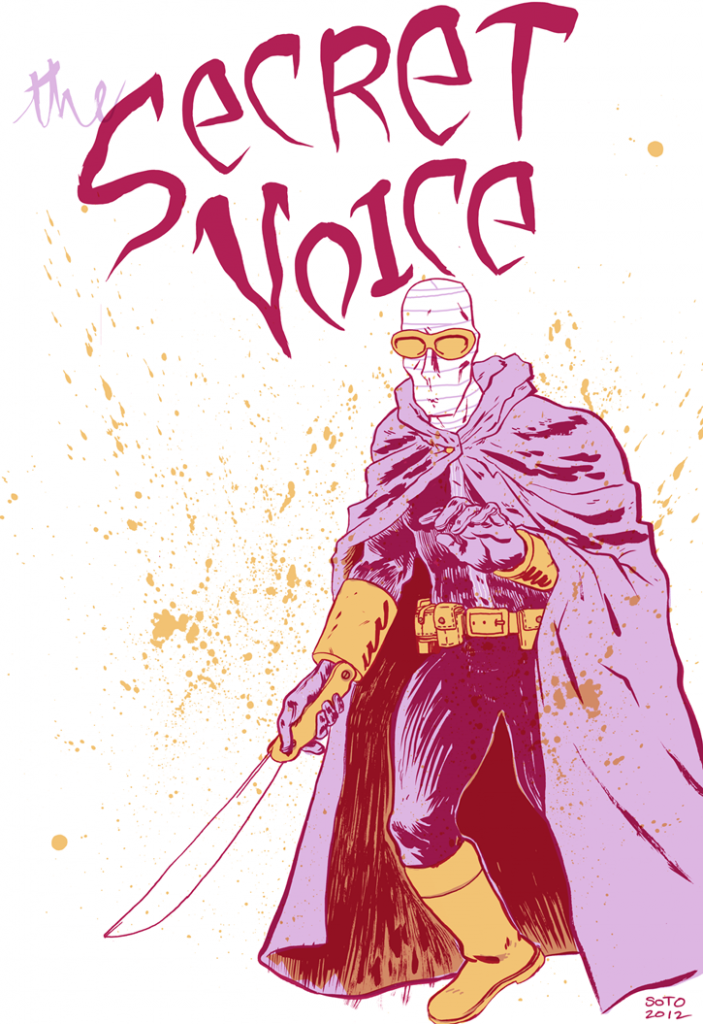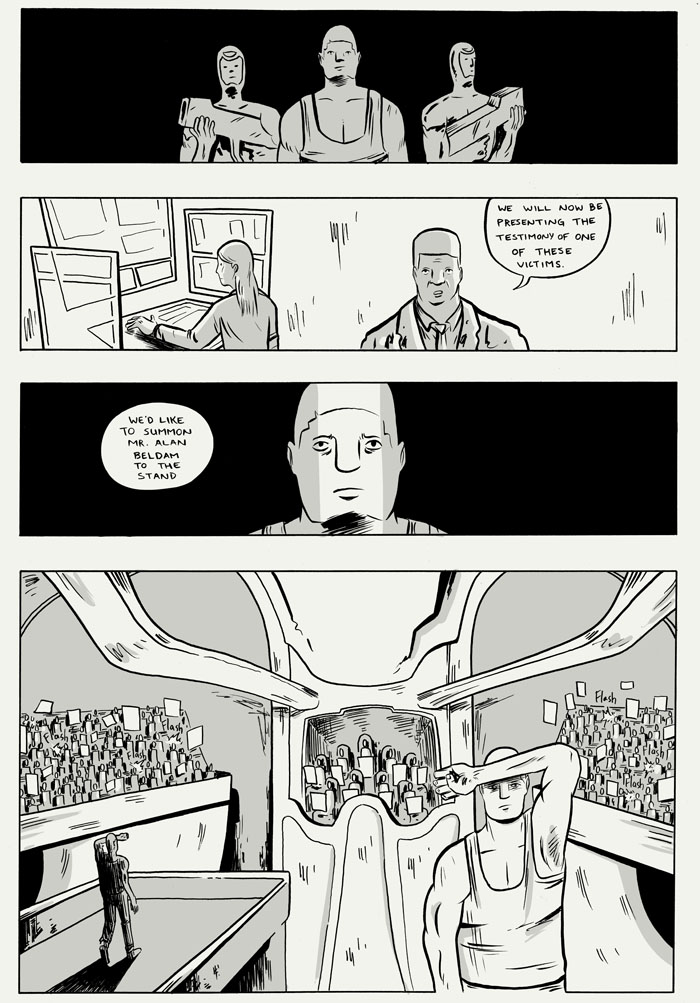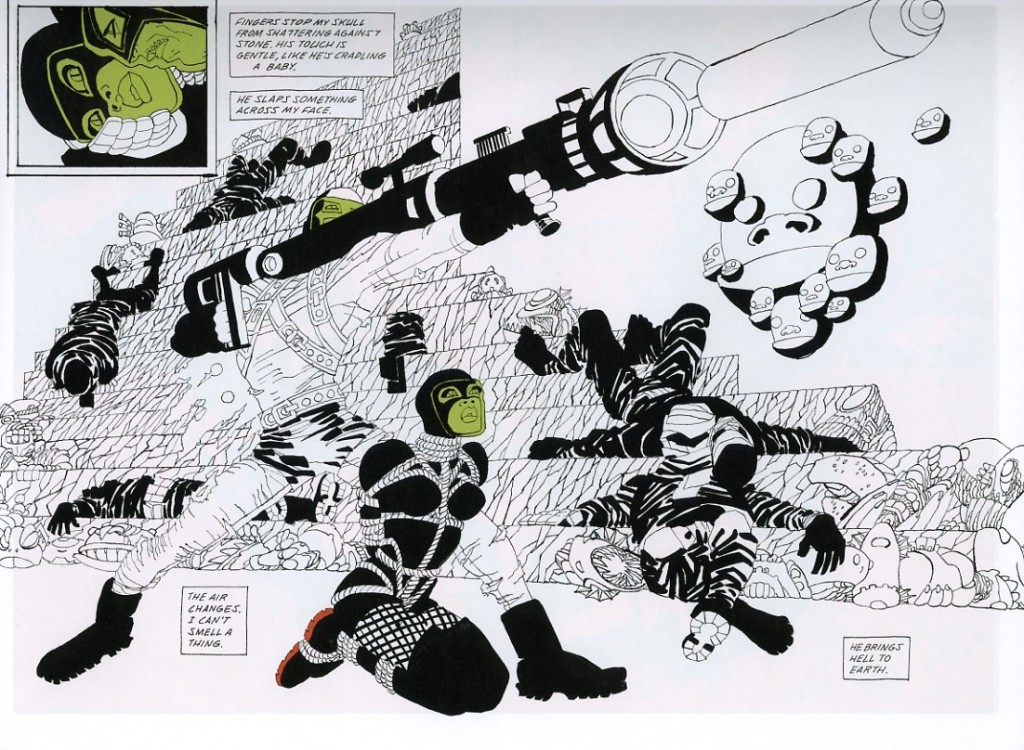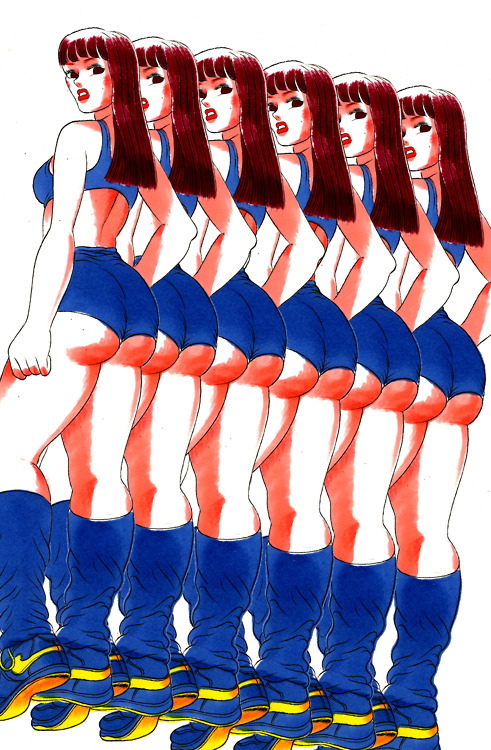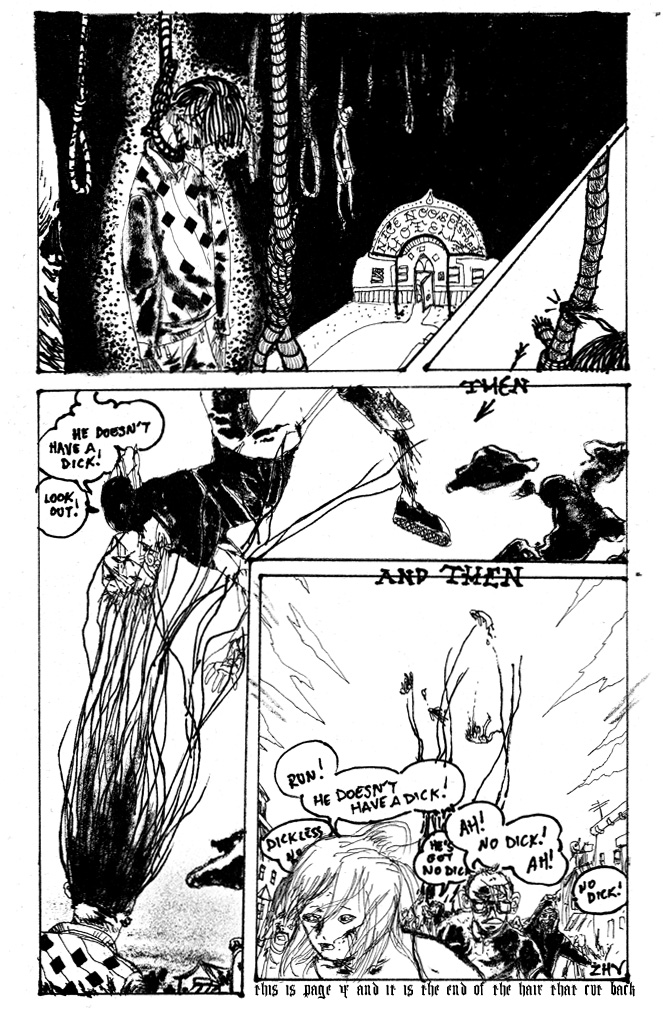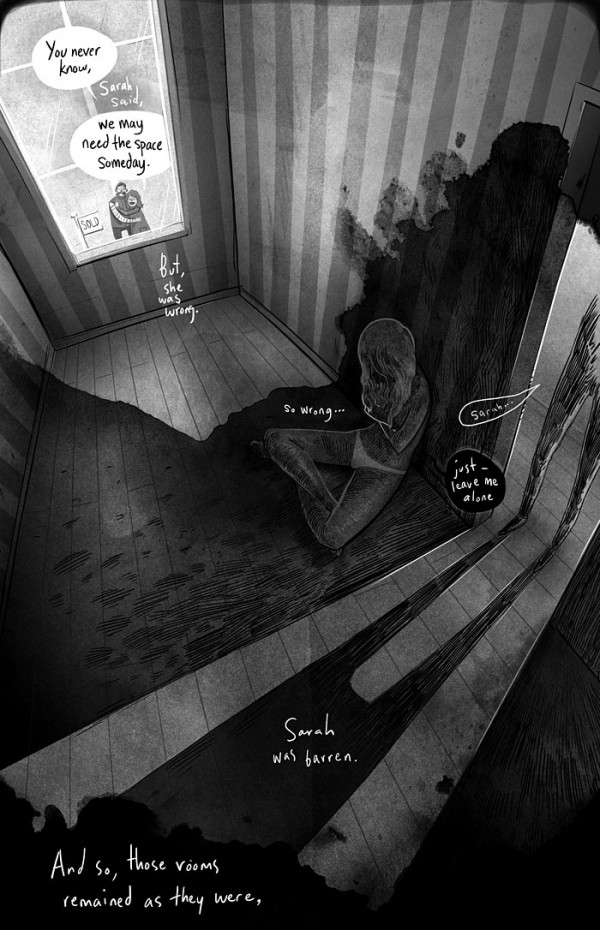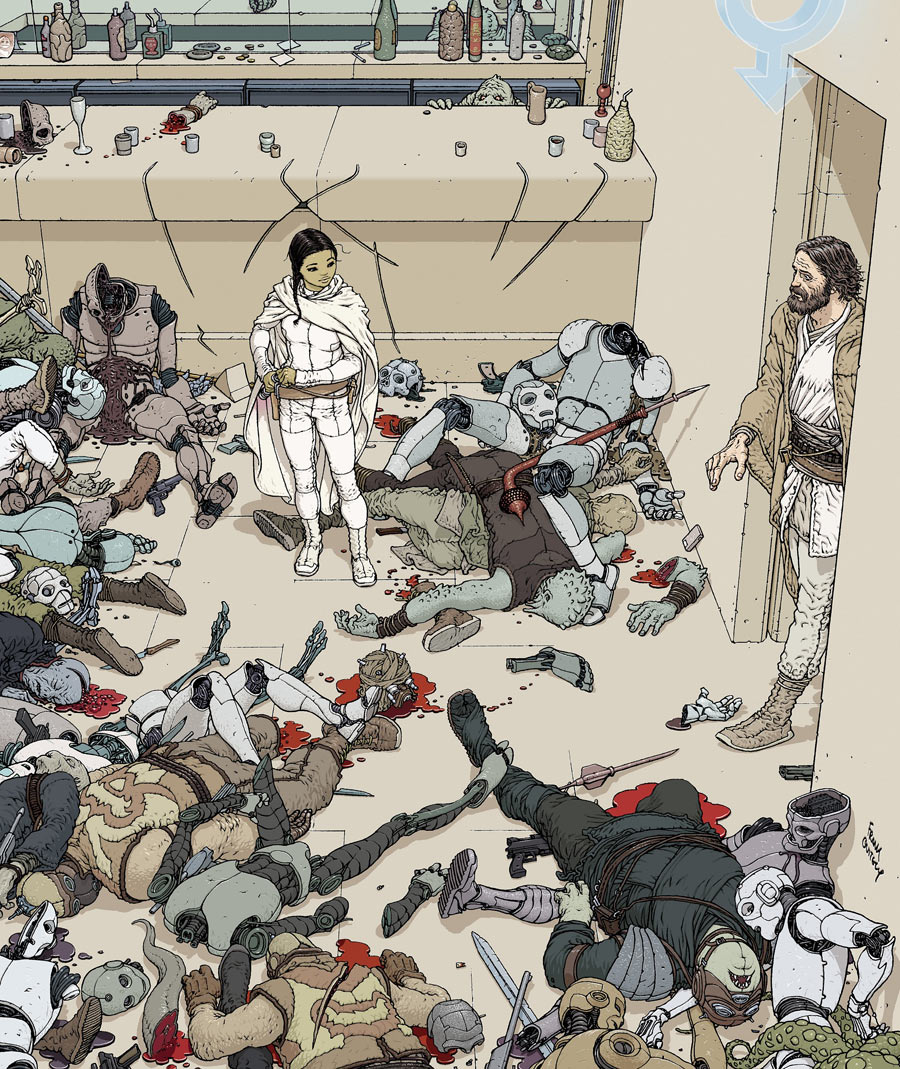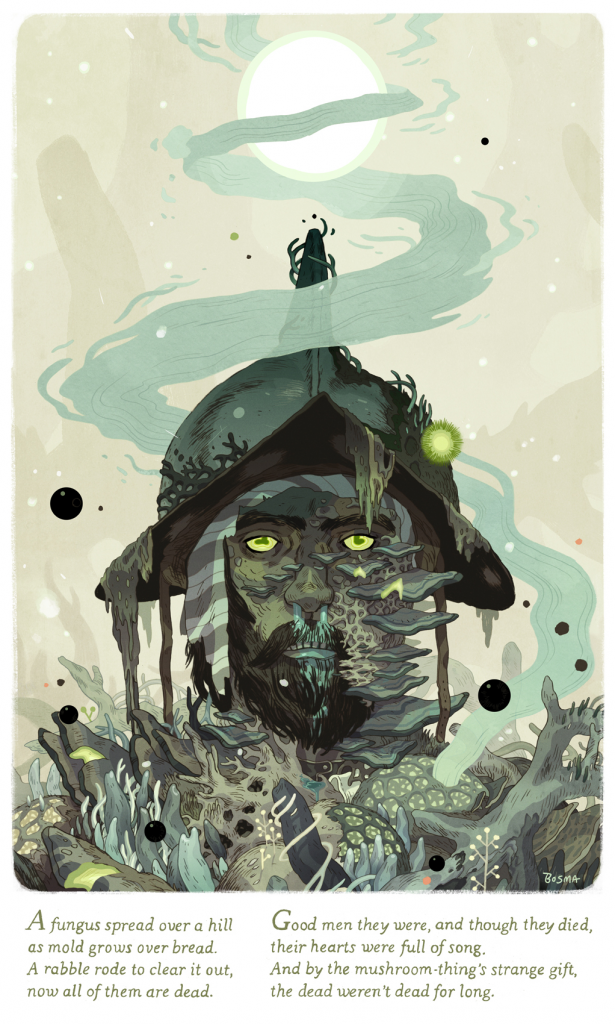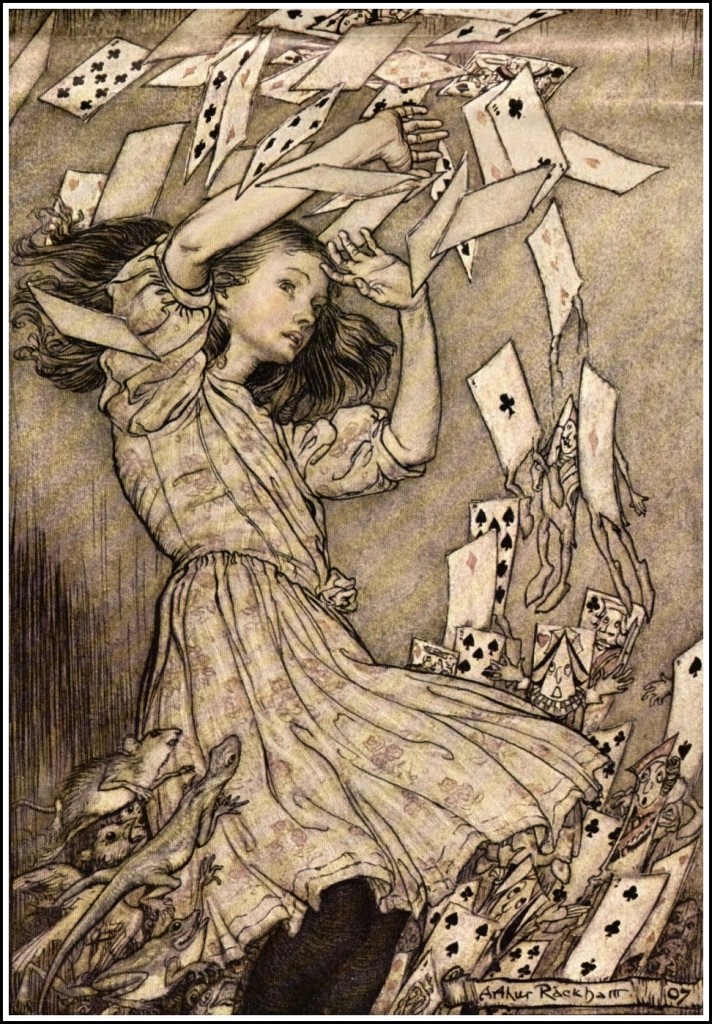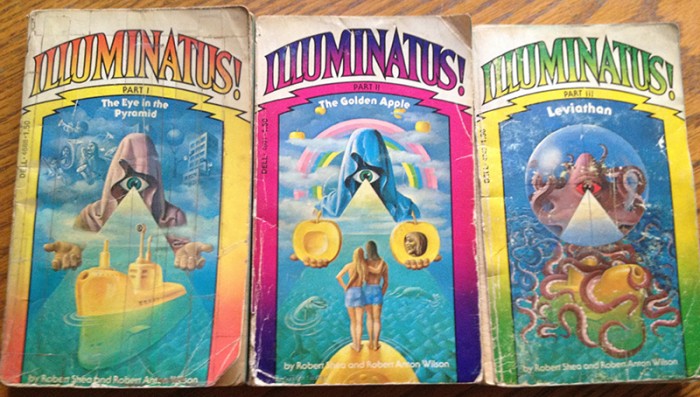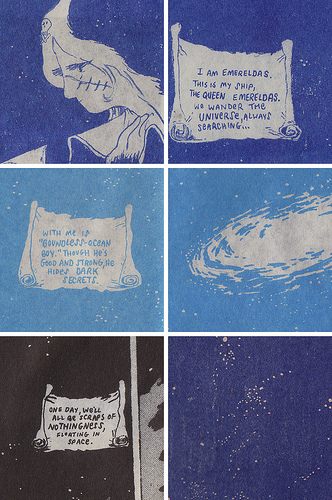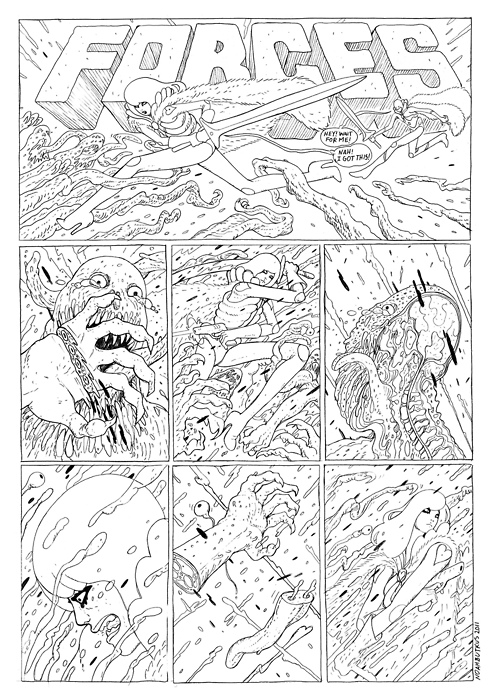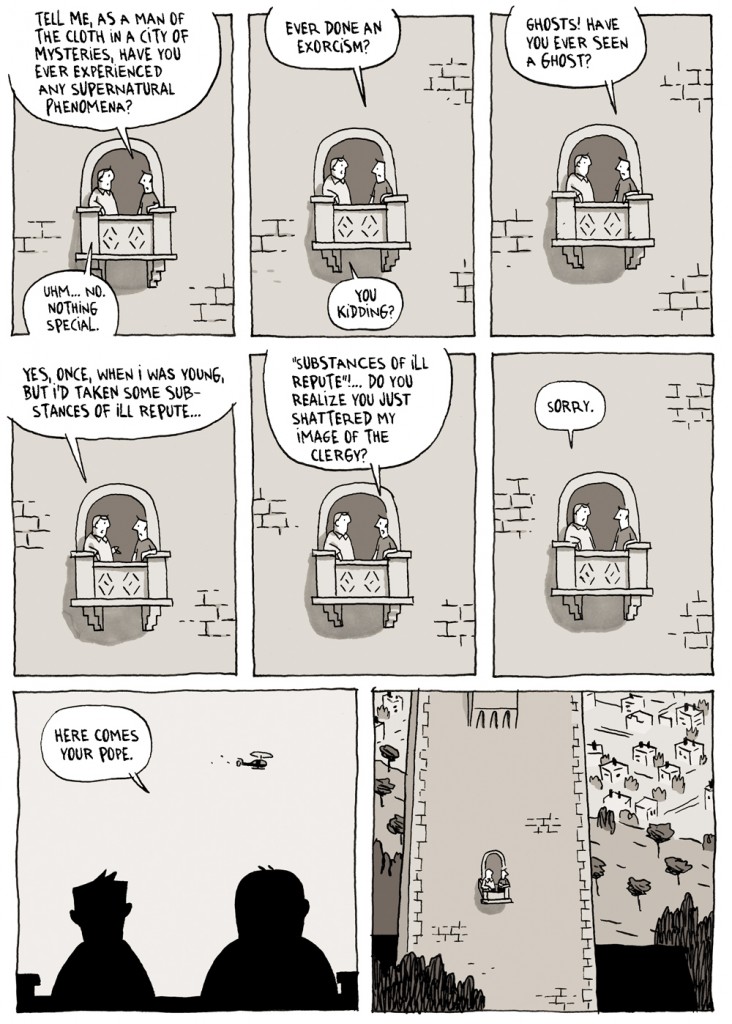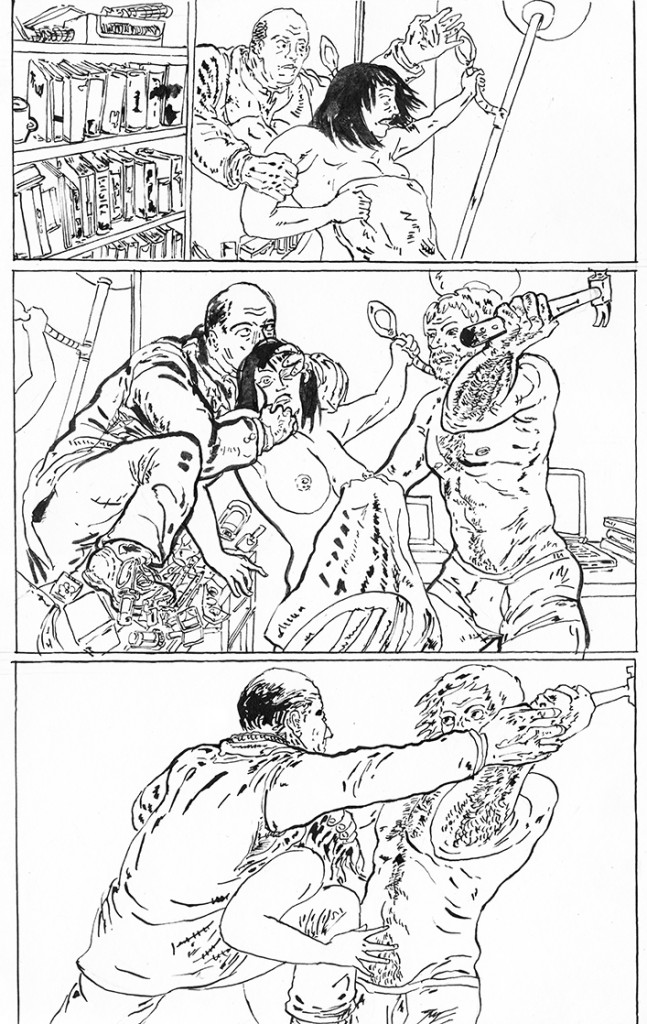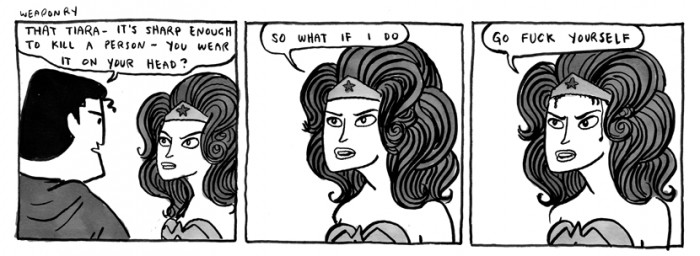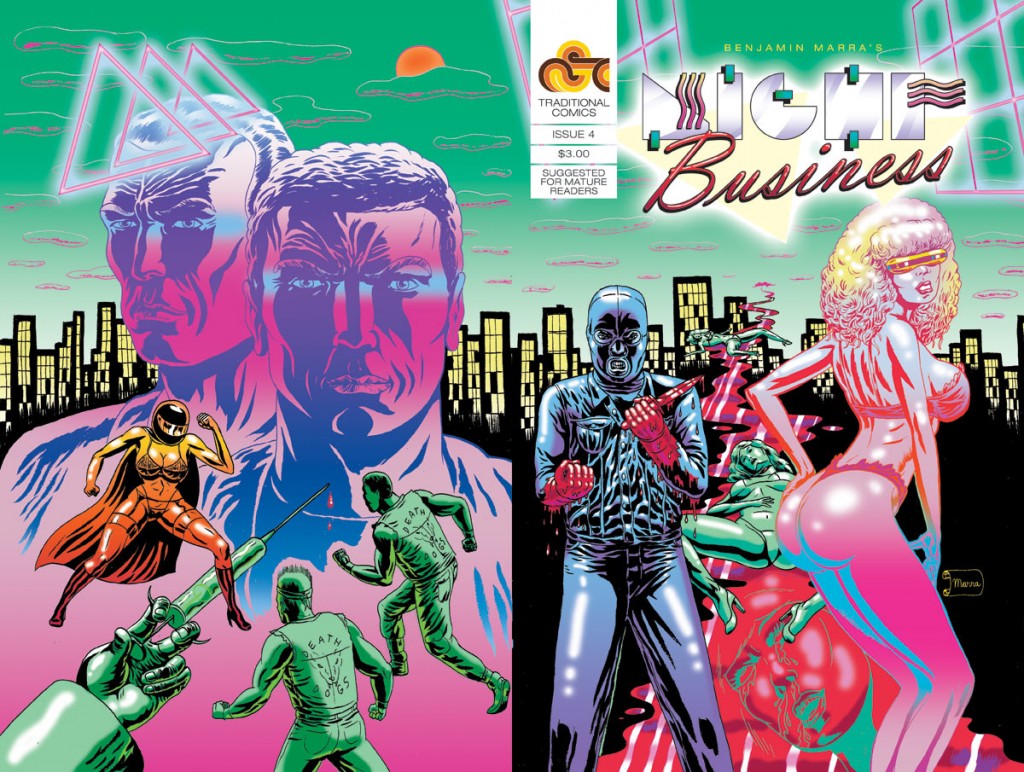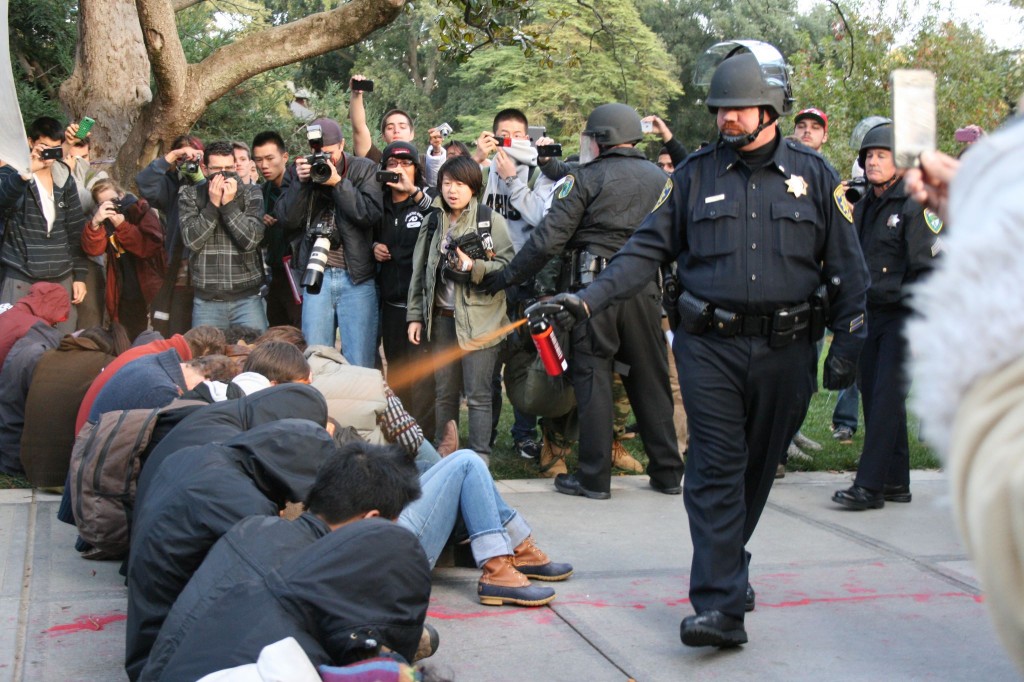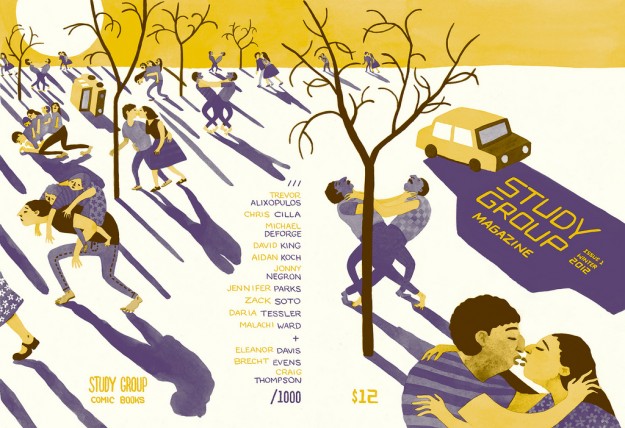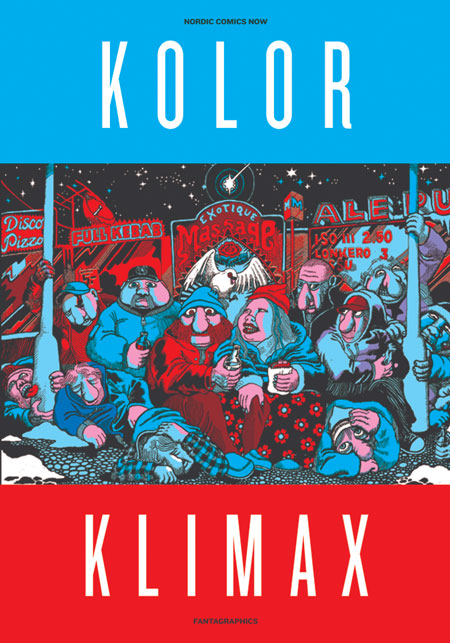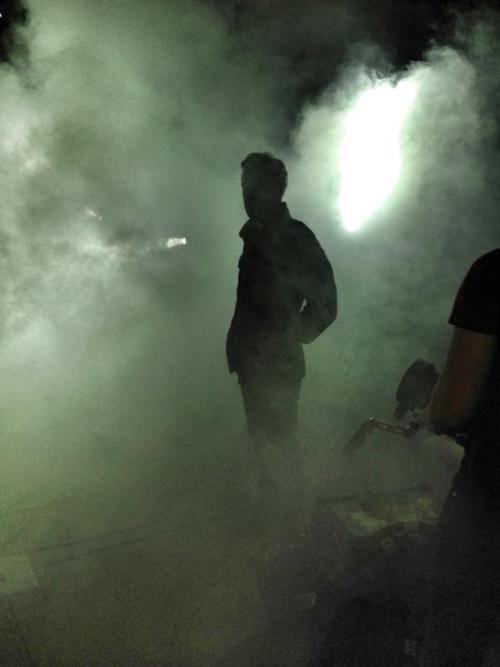Posts Tagged ‘real life’
Carnival of souls: Spurgeon, Kiersh, Campbell, Chippendale, Barker, more
February 13, 2012* Your must-read of Comics’ Grossest Fortnight is Tom Spurgeon on More Watchmen. That’s all I can really say — he says it all himself.
* Dave Kiersh fucking funded his Kickstarter book. Alright, man, alright.
* I quite enjoyed this account of the grotesque legal odyssey of Joe Simon and Jack Kirby and Jerry Siegel and Joe Shuster by Comic Book Comics‘ Fred Van Lente and Ryan Dunlavey.
* Andrew White has posted the truly fabulous concluding pages for Sexbuzz Chapter Six.
* I’ll be checking out the Ross Campbell-illustrated Rob Liefeld revival title Glory this week, for sure.
* Brian Chippendale’s Puke Force returns tomorrow! You are not prepared.
* Please go download Vito Delante and Rachel Friere’s genuinely delightful FCHS Vol. 1 for five bucks from Graphic.ly, if that’s the sort of thing you’re wont to do.
* Gabrielle Bell made a poster for Richard Linklater’s Slacker for Cinefamily. Then someone made a video out of it, set to a song by Oneohtrix Point Never, because why not. I’ll never forget how excited I was when I first saw that movie and the one guy said the words “psychic TV” in it.
austin, tx from Tony Groutsis on Vimeo.
* The great Tom Neely is doing a series of his weird one-panel non-gag cartoons for Zack Soto’s Study Group webcomics portal. This is great news, as these seem to be getting better and better as Tom goes.
* I think most all of it has been bought by now, but if you hurry you can buy some original art pages from Brandon Graham and James Stokoe to benefit Ghost Rider creator Gary Friedrich in his legally mandated time of woe.
* It’s been a while, but it looks like Uno Moralez is resurfacing.
* As with Michael DeForge, at a certain point it feels cheap of me to keep posting illustrations from Renee French. Shouldn’t you be willing to click on a French link sight unseen? I think you should.
* Finally, I should note that Clive Barker slipped into a coma and almost died recently due to toxic shock syndrome brought on by a trip to the dentist. Fortunately, he’s on the mend now. Clive is one of my favorite human beings — one of the best human beings — I’ve ever known. Get better, Clive.
Carnival of souls: Brienne, Melisandre, Stannis, DeForge, Bell, Goldfrapp, Friedrich, more
February 10, 2012* The new Game of Thrones characters look fucking great, if you’ll pardon my Tyroshi. I’m giving you the ones you really want to see below; many more publicity stills of faces new and old at the link.
* Wow. Michael DeForge’s Rescue Pet is astonishingly troubling.
* “Cartoonist Chris Ware on why other cartoonists fear Clowes”
* Gabrielle Bell is serializing her Kramers Ergot 8 contribution “Cody” on her website. I’m not clipping anything from it — you need to read the whole thing as it unfolds.
* Check out the comic Mark P. Hensel/William Cardini made for Frank Santoro’s comics correspondence course, Moon Queen. You can really see Frank’s fingerprints on this.
* Young altcomix journo of the moment Ao Meng interviews French altcomix maker of the moment Boulet.
* I’m only running the black-and-white version of Jim Rugg’s Sleazy Slice #5 cover here, because the full-color version is a must-see and his site deserves your traffic for showing it to you.
* Nice art by Renee French, and by nice I mean not nice at all.
* I found these early Dave Berg pin-up gag comics pretty sexy. (Via Tom Spurgeon, from whom I got the Rick Trembles link I posted earlier, too.)
* Saving this for later: Rob Clough’s massive TCJ interview with 1-800-MICE cartoonist Matthew Thurber. I think I’ll read this and the Dan Nadel/Marc Bell monstrosity from a while back back-to-back.
* Matthew Perpetua makes the case for Goldfrapp, the most underrated band of the past decade.
* Real Life Horror: A majority of self-described liberals love President Obama’s army of flying killer robots. A majority of self-described liberals are assholes.
* I don’t pretend to understand George Lucas.
* Finally, one last way to feel a little better about your involvement in comics: Donate to Steve Niles’s fundraiser page for Ghost Rider creator Gary Friedrich to help defray the $17,000 judgment against him on Marvel’s behalf.
Carnival of souls: special extra-large edition
February 6, 2012* They’re gettin’ the band back together, man! Tom Spurgeon breaks the news that company co-founder Mike Catron and former art director Preston White are going back to work at Fantagraphics. Spurge also interviews Catron about his return to the fold.
* I love everything about this powerful post by Jessica Abel, in which she takes a look back at the last fifteen years of her life upon her and her husband Matt Madden’s recent decision to leave Brooklyn for France. And under “everything” I most definitely include their bookshelves.
* Marc Arsenault presents a visual tribute to artist Mike Kelley, who sadly took his own life last week. Kelley’s friend and publisher Dan Nadel shared some thoughts as well.
* It’s the triumphant return of Zack Soto’s The Secret Voice!
* New Sexbuzz pages by Andrew White.
* Allow me to be the last to direct you to Darkness by Boulet, a very cute and crazily gorgeously drawn 24-hour comic. Man, the way this guy draws women.
* Speaking of crazily gorgeously drawn, Frank Miller’s Holy Terror is apparently even prettier than I thought it would be. No, I still haven’t read it, because no, I still can’t bring myself to pay for it, and no, I haven’t had any more luck finding a publicity contact for Legendary’s publishing imprint than you have. (Have you?)
* Jonny Negron celebrates the return to print of his anthology Chameleon #2 the only way he knows how.
* Zach Hazard Vaupen is still making the strangest humor comics around.
* The great Benjamin Marra has an art show opening up later this month in Brooklyn.
* Chuck Forsman is about to release The End of the Fucking World #4. This is a good series.
* If you were wondering when Emily Carroll‘s influence would start to be felt on other webcomics, the answer is right about…now. (Via Tom Spurgeon.)
* Sarah Esteje drew this picture of David Bowie’s Aladdin Sane album cover using only ballpoint pens. So, you know, jeez. (Via Andrew Sullivan, of all people.)
* I am going to link you to this Michael DeForge comic about facial growths and lesions and then never look at or think about it again.
* Tucker Stone’s excellent review of Mike Mignola, John Arcudi, and Tyler Crook’s very good B.P.R.D. Hell on Earth: Russia (he’s dead-on about Crook and company proving themselves and resuscitating the series after a stumble or two) has the bonus feature of functioning as a sort of “state of the Mignolaverse” report.
* The Mindless Ones’ David Allison/Illogical Volume writes about Batman Incorporated and a great many other things besides. The broad theme is how the sadness at the heart of Batman’s story taints his grand utopian projects in much the same way that the malfeasance of his real-world corporate promulgators taints his real-world utility as an icon of positivity. I go back and forth on whether that’s a reasonable thing to expect from art anyway — Grant Morrison’s brand of positivity has long struck me as a bit head-in-the-sand-ish, even before his unfortunate comments on Siegel & Shuster — but I’ve certainly felt the sting I.V.’s describing. Then again, I believe the pleasure we derive from art is quite independent of whether pleasurable things are happening in that art — Battlestar Galactica and Breaking Bad have at varying times and for varying reasons provided me with more emotional uplift than just about anything I can think of, and Christ, think about those shows for a moment. But I.V.’s not just talking about the content, he’s talking about the circumstances of their creation, which is quite another matter. It’s a meaty post.
* I absolutely loved the elegant simplicity (not a phrase you’d ever associate with the guy under normal circumstances) of Zak Smith/Sabbath’s post on how to advance the narrative in RPGs without railroading your players:
I call it Hunter/Hunted.
-The idea is simple and comes from about a million horror and cop stories: sometimes a scene happens because Sam Spade has found out about a baddie and sometimes a scene happens because the baddie has found out about Sam Spade. And, there, aside from a few stops for bourbon and kissing, is the plot of everything from Lost Boys to Blade Runner.
-Most investigative scenarios advise breaking things up into “scenes”–the idea is you have a scene, find clues in it, these clues lead to the next scene. They then usually cover their ass by saying either “if the PCs don’t do this or find this clue or go to the wrong place give them a bunch of hints or a prophetic dream or otherwise nurse, nudge, or nullify them until they go to the next scene” or just give some vague advice like “hey Venice is interesting, think of something”
-Not so here. Or not exactly: Basically we keep the “scene chain” structure. If the PCs go from clue to clue in a timely fashion like good investigators they follow the scene chain. However, we also give each scene a twin situation, this twin is what happens if the PCs don’t follow a given clue, follow it up the wrong path, or otherwise take too long (in-world game time) to follow the clues. In this twin situation, typically, the PCs have taken long enough to figure out what’s going on that the enemy has noticed their efforts and started hunting them.
* Real Life Horror: America’s flying killer robots target rescuers and mourners of flying killer robot victims. Warning: not liking this state of affairs may make you an al-Qaeda supporter.
* Related, in Professor T.’s “applicability” sense: Bruce Baugh flags two beautiful passages on the horrors of war from The Lord of the Rings.
* Celebrate 10 years of Fluxblog with this interview with its creator, Matthew Perpetua, my favorite music writer and a swell guy.
* Farewell to the first modern zombie, Bill Hinzman. You changed everything, sir.
Carnival of souls: Crane, O’Malley, Quitely, Bosma, Matsumoto, Rackham, Ochagavia, Rota, more
January 27, 2012* Links to new pages of comics on What Things Do don’t really work, but I assure you that Jordan Crane’s morbid, masterful Keeping Two updated this week.
* Bryan Lee O’Malley is posting some very rough roughs from his upcoming project Seconds.
* Frank Quitely does Star Wars.
* Gorgeous short weird fiction from Sam Bosma.
* Woof–this page by Leiji Matsumoto explains why Ryan Cecil Smith was moved to do an Emeraldas tribute comic.
* Golly, these Arthur Rachkam Alice illustrations are stunning. James Jean city. (Via Tom Spurgeon.)
* Tom Spurgeon lobbies for his Eisner Hall of Fame picks this year: Bill Blackbeard, Jesse Marsh, Mort Meskin and Gilbert Shelton.
* Ta-Nehisi Coates continues his crowdsourced debunking of claims that the Civil War could have been avoided, this time focusing on other anti-slavery wars.
* America: We’re #47! (Scroll down.) This post also contains this quote, which should be tattooed on my forehead: “Convincing well-intentioned people to support a war in order to depose a wretched tyrant is an easy thing to do — alas, it’s probably too easy to do, since it’s usually what leads to great mischief, human suffering, and even more tyranny under a new name.”
* I assure you, Nitsuh Abebe, there are those of us who have not forgotten Hooverphonic. The North Remembers.
* Sometimes I like to picture an alternate timeline in which Pearl Jam made a video for “Black.”
* Hail Eris! All Hail Discordia!
* Finally, my friend and collaborator Matt Rota has a show coming up: It will contain art that looks like this.
Real Life Horror Re-Education Camp
January 24, 2012* Real Life Horror galore today, and I didn’t even watch the Republican presidential debates! (I understand the Golden Rule was booed.) This represents a couple weeks’ worth of pertinent political links and thoughts, and once again I’m segregating them from the rest of my posts so that people who remember that I am a proven fool about such matters may better ignore it all.
* Despite pushback I saw in various quarters, some politically motivated and some not, the New York Times’ Public Editor really was unsure whether it’s appropriate for reporters to shoot down incorrect “facts” asserted by the people it covers rather than simply providing a platform for them — the sneer-quoted term “truth vigilantes” made this clear, and the Times’ own Executive Editor had no problem deducing so in her rebuttal to the piece — and this really was as depressing and disconcerting as it seemed at first glance.
* I don’t really have a pithy summary of this Glenn Greenwald piece on how outwardly directed violence via war and human rights violations has a disproportionate impact on minorities, the poor, and the otherwise disenfranchised here at home, so you should certainly read the whole thing. I think Greenwald remains too sanguine about Ron Paul, not only in terms of his hideous newsletter but how the policies he endorses to this day about pretty much everything but war, drug policy, and civil liberties would be devastating to the social contract and, yes, civil liberties, just in different ways and for different groups than those targeted by our current policies. That said, he quotes extensively from Martin Luther King Jr. about the necessity of opposition to war as a prerequisite for social justice, which is always welcome. And he notes that the range of views considered disqualifying for higher office should probably be broadened to include many of the policies more or less shamefacedly but still robustly embraced by the current President and his party, to say nothing of the atavistic brutality with which they’ve been embraced by his potential opponents and their party. It’s more or less impossible to vote for someone who isn’t totally disgraceful.
* Greenwald also links to Jonathan Turley’s excellent, Facebook-it-so-your-parents-can-read-it list of 10 reasons the United States isn’t really a free country anymore; freedom is a privilege afforded you by virtue of being non-Muslim and by grace of the Commander-in-Chief.
* Still on the Greenwald beat, this piece and this piece combined make for a particularly nauseating case study of sham American justice and jurisprudence, immunizing the powerful for their crimes and reducing victims and accused criminals to legal nonpersons. I find the insistence that those targeted for death must personally challenge the government’s right to do this, at which point they can then be more easily targeted and killed, particularly deliciously nauseating.
* And back on the Ron Paul beat, Ta-Nehisi Coates is slowly but surely crunching numbers and citing primary sources to debunk the easy claims made by Paul, Howard Zinn, and others on both the left and the right (though let’s be honest, mostly on the right) that the American Civil War need not have been fought because a non-violent solution, perhaps one aided by buyouts of slave owners for their human property, could have been reached. The answer is basically “you’ve got to be kidding me.” Part one; part two; part three; more to come. You’d do well to read them all from start to finish, I think. For one thing, I don’t need to tell you how pernicious the myths about the Civil War and its causes have become for America, how pernicious they’ve been for a century and a half in fact. For another, I welcome the challenge to my newfound, might as well say it, pacifism. It won’t do to wave things away with platitudes and bullshit. The rubber must needs meet the road.
* The oral history of the Guantanamo Bay detention facility, the cancerous tumor that made America break bad.
Carnival of souls: Love and Rockets, New 52 fallout, more
January 12, 2012* Wow: Fantagraphics is publishing two books about Love and Rockets this year. One’s a companion volume with interviews, unpublished art, character guides, family trees, and so forth; one’s a Love and Rockets Reader with essays by Marc Sobel. Pretty great timing given that the series is getting as much attention now in its 30th year as it ever has, because it’s as good as it ever was.
* Marvel beat DC in dollar share and market share in the direct market in December. Think for a moment about everything that changed not just at DC but across the entire industry — some for the good, some for the bad, some for the “jury’s still out” — in the name of what amounted to a three-month sales goose. Same-day digital pretty much industry-wide, new continuity, new costumes, all the redundancies and obsolescences created by same in everything from licensing to ongoing storylines to planned and abandoned storylines to licensing images to the recently launched DC MMORPG, a new business model in terms of release schedules for DC, a competing new business model in terms of release schedules for Marvel, a new way of working with talent, new internal procedures for editing and trafficking books, various controversies over race and gender and sex, hirings and firings of creative personnel, new baselines for page count and price point, big-name writers carving out little bubbles of continuity-independence for their books, major media pushes, a shaky retail sector adjusting on the fly to all of the above…and Marvel beat DC in December. Really, really, really remarkable. Tom Spurgeon has more analysis, including the always welcome remonstrance that publishers who complain about the inaccuracy of publicly available sales estimates have it within their power to provide more accurate numbers in seconds, and on a basis more comprehensive than crowing about sellouts when it suits them.
* Speaking of Spurge, I enjoyed quite a few of his final “holiday” posts, including his interviews with Laura Hudson and Chester Brown and his New Year’s resolutions, at least two of which can be summed up with “Don’t be an asshole.”
* I have a pretty low tolerance for other people’s opinions on David Bowie’s songs — through no fault of its own there are few things I’d rather read less than that one blog that’s writing about every single Bowie song in order — but I sure did enjoy Matthew Perpetua’s take on “TVC-15.”
* Michael DeForge’s latest Ant Comic manages to be the most awful one yet.

* Gorgeous cover for SF Supplementary File #2C by Ryan Cecil Smith.
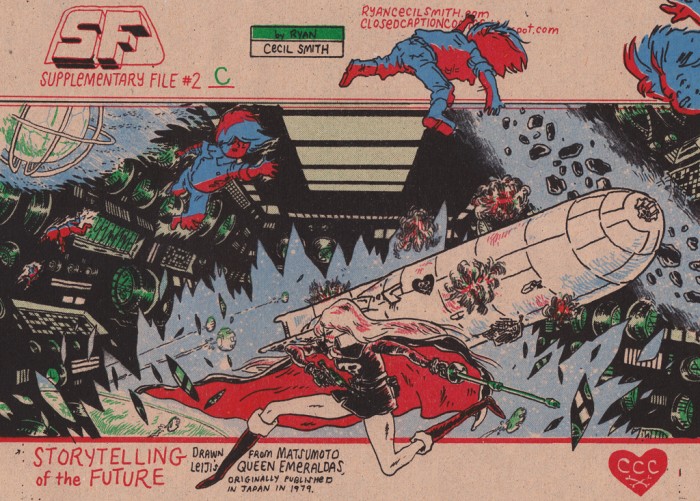
* Lisa Hanawalt does War Horse.

* Plenty of interesting work being discussed in Kevin Czap’s fifth and final BCGF haul roundup.
* Panels of 2011 is an accurately named and visually compelling new tumblr.
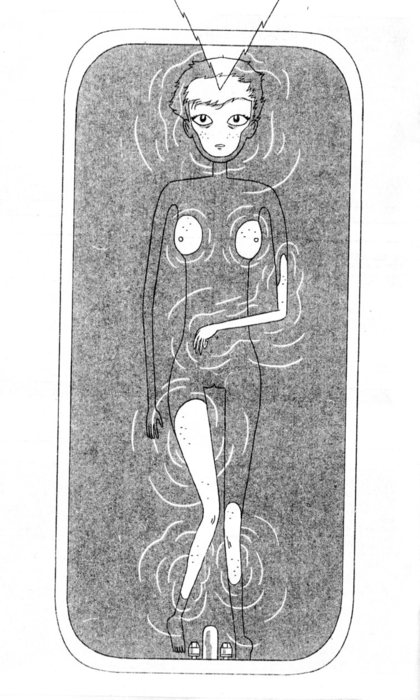
* Kali Ciesemier sketches Robyn.

* I’m historically not the biggest fan of the writer doing the adaptation, but the coming Conan comic being illustrated by Becky Cloonan will at least look as good as Conan comics have ever looked.

* Man did I like that one At the Drive-In record, a pretty peerless effort in terms of coming up with lyrics that demand to be shouted. DANCING ON THE CORPSES’ ASHES!!! Glad they’re getting back together.
* Real Life Horror: When is terrorism not terrorism? Related: I wish I’d bookmarked the post where he first made this connection, but in light of the apparent secret campaign of orchestrated murder against Iranian scientists it’s worth reiterating Greenwald’s contention that the wall of state secrecy behind which the United States hides violent overseas acts like these assassinations and our multinational drone wars is in every important way equivalent to the more voluble propaganda to which our despotic enemy regimes subject their populace, propaganda which we never fail to decry when we see it in others. The North Korean who believes the birds are crying over the death of internationally revered statesman Kim Jong-Il is not a world apart from the American who doesn’t know about all the children slaughtered by our army of flying killer robots.

* Gary Groth on his dinner with Christopher Hitchens.
* Go home and get your fuckin’ shinebox, AMC.
* Finally, behold the awesome power of Pizza Boomerang.
Carnival of Souls Post-Holiday Special #4: Everything Else
January 4, 2012* Though I think I’ve only ever played the original and Ocarina of Time, I love that Legend of Zelda continuity is so convoluted and contradictory that people theorized it must involve divergent timelines; I love even more that they were right.
* Ta-Nehisi Coates has what ought to be the final word on the vices and virtues of Louis Farrakhan Ron Paul. I don’t know why I never thought of Paul advocacy in messianic terms before, but of course that’s what’s going on; the support of noted Great Man enthusiast Andrew Sullivan, who appears to have retracted his recent retraction of his slightly less recent endorsement of Paul for the Republican Party presidential nomination, is surely evidence of that. The problem is with seeing individual politicians, with all their flaws (and in most cases “flaws” is putting it mildly, whether you’re talking about States’ Rights dogwhistler and gold bug Ron Paul or indefinite-detainer and non-due-process-assassinator and Skynet-activator Barack Obama), in memetic-engineering terms — “If we support this person we’ll change the conversation and steer the nation toward the good” — fails to consider the systemic nature of successfully implementing change, and dismisses a host of hugely problematic issues with any given candidate in a rush to paint an Alex Ross version of their portrait. And again, no one’s forcing anyone to endorse anyone; doing so as an act of supposed bravery but downplaying your candidate of choice’s problems is in fact an act of cowardice.
* Related thought triggered by Coates’s material on Farrakhan: All religions are completely crazy in terms of their “supernatural history,” if you will; it’s just that we’ve been hearing about the major ones for so many centuries that receiving celestial instructions from a brushfire or rising from the dead and then flying up to Heaven no longer seem quite as crazy as more recent developments like the Angel Moroni or Intergalactic Warlord Xenu do. That said, I feel like between Mormonism, Scientology, and the Nation of Islam, America has cooked up some uniquely science-fictional cults-cum-full-fledged-denominations, and I wonder if anyone’s ever stacked them up side to side as such.
* Jim Henley wrote a song for America; they told him it was clever.
* I hadn’t been super enthused for Ridley Scott’s yes-no-maybe-probably-yeah-definitely Alien prequel Prometheus, because it’s 2012 and it’s Ridley Scott. Then I saw this trailer. Any knucklehead can make a compelling trailer, but pacing and music and title font treatment aside, you simply don’t see scary cosmic monoliths like you did in ’70s SF anymore. Seeing that giant whatever-it-is on that alien planet was like coming home.
* In case you missed it, my favorite fantasy franchises gave us several Christmas presents:
** Here’s a sample chapter from George R.R. Martin’s The Winds of Winter. (SPOILERS, of course!) The great Elio & Linda of Westeros.org discuss it here.
** Here’s a trailer for Season Two of Game of Thrones. Everyone looks great and Stannis sounds great.
** And here once again is the trailer for The Hobbit, which I suppose I should get used to calling The Hobbit: An Unexpected Journey for the purposes of this first film. The chills I got when the Dwarves started singing their song! Straight-up outreach to everyone who was raised on the Rankin-Bass cartoon, and successful outreach at that. BTW, I saw a lot of talented artists complaining about what they perceived to be fussy, overly toyetic, off-brand Dwarf designs, but let’s face it, the filmmakers had to help the audience be able to differentiate between thirteen axe-wielding beardos, because it’s not really like Tolkien himself even tried!
Real Life Horror Special: Hitch and Kim
December 20, 2011Kim Jong-il, by all accounts a terrible, terrible man who helped make the country he ruled the consensus choice for worst place on Earth, died. The Orwellian cast of life in North Korea never ceases to fascinate and horrify, and Kim died as its architect, with a great deal of blood on his hands. A miserable person.
The timing of his death alongside Christopher Hitchens’ is darkly fortuitous.
Thinking about Hitchens, I wonder if his fatal flaw — literally, sadly enough — was machismo. For all his erudition, you can’t help but notice a stubbornly incurious streak in him where matters of non-hetero- or non-dude-ness were concerned. Perhaps this was a generational artifact, but what can you say about someone who apparently needed “persuad[ing],” to hear Andrew Sullivan tell it, that being gay has an emotional and romantic component beyond sex? Or who argued, at length, recently, in a publication intended for a very wide audience, with a straight face, that women aren’t funny? Or who dismissed the panoply of thought on abortion with a pro-life wave of the hand, as if talking to an actual woman or doctor about it had never crossed his mind? (See Katha Politt on these last two matters.) The life of the mind was something Hitchens celebrated every day and in nearly every essay or article, and that was one of the great pleasures of reading him. But his prodigious drinking, the evident relish with which he fought with people, and especially his tendency cheer violent conflict if he felt that people whose ideas he disliked would die in it, are when taken in tandem with the above attitudes toward women and homosexuality indicative less of a public intellectual and more of a meathead picking fights with the opposing team’s fans in the tailgate parking lot.
Unfortunately, when couched in antifascist, pro-human rights language, this macho belligerence was in many ways exactly the siren song I wanted to hear after 9/11. Hitchens was, if not the sole, then certainly the most prominent and to my mind persuasive person on either side of the debate who was talking about the virtue of toppling dictatorships and crushing violent religious fanatics. Years and years and years of genre and conspiracy-theory reading, plus a passionate anti-religious streak, plus the mentally destabilizing trauma of the murder of thousands in the city I worked in and loved so much, primed me for this message. I ate it right up and spat it back out at anyone who’d listen, and anyone who wouldn’t. At last, I thought, after decades of using our power to keep dictators in place, America was finally going to use it to take them down! I shared Hitchens’ dark glee at the prospect. Indeed, no one was more influential over my support of the wars in Afghanistan and Iraq than Hitchens. He gave me what I needed to do it at all, I think. I remember telling people that if not for Hitchens, I’d have felt like I’d gone completely insane. Which, perhaps, I had.
In the end, life isn’t a fucking Authority comic book. I can’t, as a person who found himself thrilling to the burning of the churches in Homage to Catalonia, say that Hitchens’ infamous delight in cluster bomb fragments that will tear right through a Koran on the way to some benighted al-Qaeda fuck’s heart is alien to me. But those bombs found a lot of other people as well. Hundreds and hundreds of thousands of them. And in dropping them we also unleashed an atavistic tide of brutality, torture, state surveillance and oppression, and endless global warfare waged by an unaccountable executive branch; those bullets tore through not just Korans, but nearly every document we enlightened Westerners hold dear back through the Magna Carta. I’m no longer capable of performing the elaborate mental arithmetic necessary to excuse all this, and to excuse the deceptive and criminal way it was ushered in, because other people are bad. This is bad! When you’re primarily animated by hatred, as Hitchens was — and even though he generally hated genuinely hateful things — making the bastards pay is paramount. But the bastardry gazes also.
So Hitchens went to his grave quite literally praising endless war — a morally shameful philosophy that if adhered to would basically ruin civilization. But you don’t need to take my word for it. You can take the word of Hitchens’ hero, George Orwell, who wrote a book you may have heard of in which perpetual war was the core evil. Or you can take the word of Hitchens himself. I remember vividly his definition of terrorism: Demanding the impossible, and demanding it at gunpoint. How else to describe Hitchens’ call for a state of unceasing violence as some sort of curative for the other, wrong kind of violence?
I also recall (though I can’t find an exact link; take my word for it, please) Hitchens repeatedly admonishing anti-war forces for, in effect, acting according to the wishes of the enemy. But Hitchens died arguing that “we do have certain permanent enemies—the totalitarian state; the nihilist/terrorist cell—with which ‘peace’ is neither possible nor desirable,” calling for a war against them “that seems destined to last as long as civilization is willing to defend itself.” That’s a grandiose way of describing a struggle against a ragtag bunch of rogue states and a bunch of isolated bands of theocratic thugs who are lucky if they can set off a car bomb anymore, which is part of the problem, but putting that aside, is this not allowing the enemy to set terms? We must keep killing as long as people want to kill us?
But — and this gets back to the point about mindless machismo — this prospect, horrifying though it is and should be to most people, held no special unpleasantness for Hitchens. “Human history seems to register many more years of conflict than of tranquility,” he shrugs. “In one sense, then, it is fatuous to whine that war is endless.” By that perverted logic, since human history also seems to register many more years of, say, dictatorship, or torture, or slavery, or racial war, or holy war, then it is equally fatuous to whine about any of that. Or to dedicate one’s life, supposedly, to the cause of human rights and human freedom. But in order to cling to his argument, Hitchens was forced to implicitly reject all the arguments he’d ever made leading up to this one.
Which brings us back to the North Korea of Kim Jong-il. Last year Hitchens recalled his own visit to the country on the occasion of a book about North Korea’s manic chauvinism by B.R. Myers. “Myers makes a persuasive case that we should instead regard the Kim Jong-il system as a phenomenon of the very extreme and pathological right,” Hitchens wrote. “It is based on totalitarian ‘military first’ mobilization, is maintained by slave labor, and instills an ideology of the most unapologetic racism and xenophobia.” Later he notes, “Every child is told every day of the wonderful possibility of death by immolation in the service of the motherland and taught not to fear the idea of war, not even a nuclear one.”
Does this sound familiar?
Glenn Greenwald makes the case against Hitchens, and more specifically against remembrances of Hitchens’ virtues that don’t grapple first and foremost with this appalling stain on his legacy and what he might hesitate to call his soul, far more eloquently and devastatingly than I am. (He includes more cases where Hitchens is hoisted by Orwell’s petard, a grimly satisfying business.) But that’s no surprise, even aside from Greenwald being Greenwald and me being me. My heart’s not in this. It’s a strange thing, to think back on a man whose work I indelibly associate with sensations of great intellectual and philosophical pleasure, and to know despite those sensations’ lingering reverberations, it was poison all along.
Christopher Hitchens
December 16, 2011Few writers had more of an impact on me, for better and for worse. Enjoy oblivion, man.
Carnival of souls: Tom Neely, Craig Thompson, BCGF aftershocks, more
December 15, 2011* Wow, Kristy Valenti interviewed the bejesus out of Tom Neely for The Comics Journal. It’s certainly a must for fans of The Blot or The Wolf, but even if you’re not it’s worth your time just as a portrait of an artist. I explain a bit more about that over at Robot 6.
* Craig Thompson is working on three new books: one’s all-ages, one’s non-fiction, and one’s erotica. It’s like he got zapped with that beam that split Superman into Superman Red and Superman Blue back in the day.
* Bill Karatlopoulos’s essay on Daniel Clowes’s superhero comic The Death-Ray doubles as an excellent capsule history of comics’ rise to pop-cultural and media prominence in the early to mid ’00s. That New York Times Magazine cover story was a true “Made it, Ma! Top o’ the world!” moment; I’m not sure it’d be possible for people who entered comics after it to appreciate what an Event it was.
* Massive BCGF haul review/report from Kevin Czap. And it’s only Part One!
* Ryan Cecil Smith’s stealthy BCGF debut SF Supplemental File #2B is now available outside the Closed Caption Comics #9.5 box set. It looks purty. Riso printing, amirite?
* Excuse me while I wolf whistle at this page from “Forces” by Noah Butkus, out of the Happiness Comix anthology that I now wish I’d made a point of picking up at BCGF. Good gravy!
* Real Life Horror: Drones in America.
* But let’s end on a couple of up notes: In light of the news that Christopher Meloni is joining the cast of True Blood, Jason Adams asks the only question that matters.
* And there’s nothing I could say about this selection of photographs from a Van Halen in-store signing appearance from 1978 that could possibly top 33 1/3’s John Mark’s assessment for accuracy: “The kids in these pictures are the very definition of ‘at-risk teens.'”
Carnival of souls: Game of Thrones, BCGF, more
December 12, 2011* There’s a new teaser trailer for Game of Thrones Season Two. It centers on one of the new characters being introduced this season, which puts me in mind of several other shows that have introduced major new antagonists after their debuts and how they’ve positioned them relative to the preexisting players.
* Related: I’m not sure if I’ve ever mentioned this, but my A Song of Ice and Fire tumblr All Leather Must Be Boiled has a whole lot of ASoIaF/GoT art/fanart on it. Today I posted this grim painting of the Riverlands by Rene Aigner, which says a whole lot about the series.
* More BCGF: L. Nichols flips the eff out over the show;
* and PictureBox stocks up on many of its highlights and hidden gems for its online store.
* More Jerusalem preview pages from Guy Delisle. This is shaping up to be a really lovely book.
* I don’t think there’s an easy way to link you to all of it, but sniff around Benjamin Marra’s Traditional Comics tumblr for a lot of art from his series of American Psycho tribute booklets.
* The Comics Journal presents a look at four prominent alternative-comics retailers by Patrick Rosenkranz. The amount of thought and creativity they put into promoting the comics they sell and attracting the audience that buys them is both inspiring and a little depressing, in terms of how much time and energy you need to invest if you wanna make a go of this sort of thing.
* Entertaining speculation about the evolutionary origins of monsters in the human mind, the idea being that early man’s brain combined features of all the animals it was worried about getting attacked by into creatures like dragons and such, as a kind of shorthand for “LOOK OUT, DANGEROUS ANIMAL!” (Via Andrew Sullivan.)
Carnival of souls: Special “post-Shamus/post-BCGF” edition
December 6, 2011* So yeah, Gareb Shamus has resigned from Wizard. By their works ye shall know them.
* Tom Spurgeon’s BCGF con report is the most thorough you’re likely to find. His assessment of the show itself centers on the caveat that (like all shows) it’s not a show for everyone. I’m really curious as to how deeply that analysis takes root, because most everyone I spoke to at the show was almost deliriously happy with it (myself included — yes, I talk to myself), but it’s easy to see how the narcissism of small differences among comics people could lead someone whose conception of “good comics” doesn’t quite overlap with BCGF’s, or has almost nothing in common with it at all, could really hate that show from afar or even up close. But I think this is the extent of my desire to discuss the show through this lens, because I don’t think I really discuss anything by saying “some people who aren’t me might not like this that much.” And BCGF is an amazing fucking show. Just ask ADDXSTC fave Geoff Grogan, who I can’t remember ever penning this effusive a con report before — doubly surprising given that in the past he’s been at loggerheads with the Kramers Ergot aesthetic that is the show’s backbone.
* Among the many, many, many, many, many books Closed Caption Comics debuted at the show were Conor Stechschulte’s The Amateurs and the Noel Freibert-edited anthology Weird.
* Emily Carroll got herself a big NYC publisher book deal. Well deserved.
* Geof Darrow’s lost Superman cover will show up in print after all. Hooray!
* Isaac Moylan presents “The Mirror.”
* I feel like I’ve written these exact words before, but Jesus Christ, Renee French.
* Uno Moralez continues to tap directly into my underbrain.

* Apparently I never properly subscribed to the RSS feed on Geoff Grogan’s new site, because otherwise I’d be linking to pages from his terrific book Look Out!! Monsters all the time.
* Kate Beaton’s Wonder Woman comics are terrific.
* Finally, now that I’m embarking on Breaking Bad, I want to go back to a couple other shows I wrote about this fall and highlight a pair of reader comments I got a lot out of: Alan on Mad Men Season Four and Hob on Boardwalk Empire Season Two. Spoilers ahoy, obviously, but Alan’s thoughts on a certain MM-late-S4 character contrast that hit home with him on a personal level opened my eyes to a whole new way of seeing the show’s central family dynamic, and what Hob said about the link between nihilism and sentimentality smacked me right between the eyes. Thank you, gentlemen, and thank you to everyone who comments on my TV posts — pretty much no matter what show I’ve written about, you’ve been a consistent, collective delight and reward.
Carnival of souls: Matthew Weiner interviewed, Vince Clarke and Martin Gore reunited, more
November 22, 2011* I feel like every moment of my marathon run through all four seasons of Mad Men was leading me to this: A five-hour interview with series creator Matthew Weiner. This is heaven, absolute heaven. Everyone who created a work of art I enjoyed as much as Mad Men should be interviewed about the entirety of their life and career for five hours. And Sopranos fans will absolutely want to watch this as well, as he talks about his involvement in that show at length, and makes an argument for its greatness. (And reveals that he is the Peggy to David Chase’s Don.) My favorite thing about it is Weiner’s good humor and streak of genuine humility/self-deprecation. He’s not needlessly hard on himself — obviously he’s quite good at his job, it’d be stupid to deny that — and nor is he an egomaniac. If you know any talented successful creative people that you personally are friendly with, he sounds like those people. What a treat!
* Great googly moogly: Vince Clarke and Martin Gore are reuniting! This makes me happy in my heart. When I watched that BBC documentary Synth Britannia a while back, I was struck by how a dude like Clarke who made such warm music ankled the rest of Depeche Mode in such a cold way. These were his friends from school, and he ditched them because advances in technology had allowed him to do everything he needed to do (except sing) by himself, so his friends were now superfluous. So glad to see two of my favorite synthpop songwriters working together again, even if it’s for a minimal techno album.
* Five new B.P.R.D. miniseries next year! Way to take advantage of the apocalyptic 2012 zeitgeist.
* I’m bummed to see the very good Panelists group blog shutting down. I’d actually been wondering about this, seeing as how co-founders Craig Fischer and Charles Hatfield have columns going at The Comics Journal. But hey, there’s your silver lining, innit?
* Interesting: The Last Vispo Anthology: Visual Poetry 1998-2008. Curious to see what this looks like.
* Fantagraphics: minicomics publisher!
* “With Great Power Comes No Responsibility.” Tattoo it on your forehead, America!
* Wizard’s Gareb Shamus is blogging and tweeting and quietly shutting down his digital magazine.
* Amazingly, Jason Adams of My New Plaid Pants interviews Michael Fassbender and never once asks to see his penis! He doesn’t even hint around at it! Jason, I’d like you to know that whenever I think of him now, I mentally refer to him as Fassy, without fail.
* Happy 71st birthday to Cardinal Fang Terry Gilliam, one of the very best people.
* And congratulations to Anders Nilsen for his book Big Questions‘ deserving presence on the New York Times Book Review Notable Books of the Year list. As you can see from the review-link sidebar on my blog, I’m its biggest fan, although I have yet read the collected edition. But then I have yet to read a ton of promising comics that have come out this year. I’m hoping to reorganize my life to make that possible again. It’s so important to me to have my hands in these things. It makes me feel better as a person and happier in life. Do you know what I mean?
Carnival of souls: Night Business #4, Lose #4, more
November 21, 2011* Benjamin Marra’s Night Business #4 is on sale now! Wow, this is a big year for Ben.
* I take this Michael DeForge post to mean that Lose #4 is on its way. And here’s some illustrations and a strip, because it’s Michael DeForge and a couple of days have past since the last set of illustrations and comics he posted.
* Jason Leivian reviews the Mat Brinkman-designed board game Cave Evil. Good gravy.
* Dustin Harbin draws Osgiliath.
* Ben Morse is right: This is an incredible Survivor Series team.
* Is it just me or are con/signing photos of cartoonists getting better lately?
* Finally, a happier Occupy Wall Street story: behold the bat-signal of the 99%. I can’t be the only person who saw this and thought Turk-182!, right?
Carnival of OWS
November 21, 2011* I’ve decided to put all my Occupy Wall Street stuff in its own round-up post today rather than mix it in with the usual comics/etc. talk, primarily out of lingering embarrassment over the intellectual and moral failings of much of my previous political writing. At the same time, I feel very passionately about this and can’t not write about it. I encourage you to read or not read as you feel befits me writing about political matters.
* Real Life Horror: I remain stunned by and frankly fixated on the weekend’s assault on peaceful protesters by pepper-spray-wielding police at UC Davis — both by the repugnance and casual ease of the act itself, and by the student protesters’ remarkable response. I’d like to note that the coverage of The Atlantic in particular has been thorough, informative, and impassioned. A sampling:
** Ta-Nehisi Coates links the use of a chemical weapon to force compliance on nonviolent protesters to the commonplace extralegally punitive “contempt of cop” violations common among poor neighborhoods and prisons.
** Coates also notes that the use of pepper spray for non-compliance is quite literally standard operating procedure for some police forces. I’m not a fan of ready-to-hand non-lethal weaponry like pepper spray, tasers and the like, because it’s clear that too often they’re used not as an alternative to deadly force but as an alternative to no force, or to just physically subduing a dude with no weapon who’s being a pain in the ass. That said, I assumed that there at least had to be some kind of defense-of-self-or-others justification for their use, like the bubbemeise the UC Davis police force initially ran up the flagpole about the cops being surrounded and cut off. But apparently I’m wrong, and in places like Baltimore police are taught to assault people for the crime of not following orders.
** I also want to make clear that as Coates says over and over, we get the police we want. I don’t wish to demonize the occupation (as in job) of being a police officer, or police unions. We should all have unions that wield that kind of power. To the extent that police behavior is problematic, and it’s hugely problematic as far as OWS is concerned, we the people have invested them with the powers they’re using to cause those problems, by electing people who are comfortable giving them those powers, and not saying anything when they start using and abusing them.
** How problematic is police behavior against OWS? Garance Franke-Ruta has a video-heavy roundup of incident after incident of police brutality against nonviolent, passively resisting protesters. Again and again, the deployment of riot gear and anti-riot tactics against people who aren’t rioting. Again and again, the use of non-lethal weapons where no weaponry is called for. Again and again, noncompliance and passive resistance treated as a crime requiring onsite corporal punishment or paramilitary-style force. I don’t know how to see this as anything but a sustained campaign of political violence against dissidents. Against dissent.
** How did we get to this point? Alexis Madrigal traces the history of police response to protest events by American police forces throughout the modern era. His argument is interesting in that he follows a track parallel to the one many commentators are using, that of militarized police forces via the war on drugs and the post-9/11 security state. Rather he focuses on the 1999 WTO protests — “The Battle of Seattle” — as a transformative event that inspired police forces nationwide to toss their more tolerant post-Vietnam/Civil Rights procedure for protests out the window, adopting instead a proscriptive approach that greets any protest that escapes predetermined boundaries with overwhelming force. He also factors in the rise of “broken windows” law enforcement, arguing that an approach originally intended to enhance quality of life and set an “as below, so above” model for fighting major crimes by targeting minor ones instead ended up elevating order and cleanliness to moral imperatives, thus rendering anything that threatens totally smooth sailing a public menace. His point, again, is that the problem is much bigger than a problem with Lt. John Pike, the pepper-spraying cop, and his fellows at UC Davis, or in the other police forces that have attacked OWS protesters. The problem, for the protesters and the public but also for the police themselves, is the system that makes men like that men like that. This may be the meatiest article of the lot.
** James Fallows’ post comparing the instantly iconic imagery of Lt. Pike sauntering up and down a line of college kids blasting them in the face with a corrosive chemical agent to similar images of Southern police and fire departments attacking Civil Rights demonstrators with fire hoses and the like raises an important point. With the civil rights protesters, the commonality between the attacks and the underlying issues was clear: These people were demanding the right to be treated like human beings by the authorities, who responded by not treating them like human beings. As Josh Marshall says at Talking Points Memo, however, Occupy Wall Street wasn’t about physical human rights violations of this sort until the police started physically violating the human rights of the OWS protesters. The underlying issue of economic exploitation of the middle and lower classes by the ultra-rich and the corporations they control really doesn’t have much to do with police misconduct at first glance. But as Donald Rumsfeld will tell you, when you can’t solve a problem, enlarge it. And as Glenn Greenwald or the comics blogosphere’s own Tim O’Neil will tell you, the ease with which civil authorities can send police to violently suppress protest movements is a symptom of the same system of two-tiered justice, economic inequality and immobility, and elite seizure of all the levers of power for their own ends that produced other symptoms like the bank meltdown, the European debt crisis, the American housing crisis, the current and ongoing un- and under-employment crisis, and on and on and on. The system may be broken, but that is not to say that it is not still a system, one designed to achieve certain results for certain people. The ease with which Mike Bloomberg could dominate the front pages of every local newspaper and the opening segment of every local newscast this morning with some farcical lone wolf “terrorist” bust that even the bust-manufacturing Feds couldn’t be bothered with is another case in point. Noise can be made and pressure can be applied, but only the right noise and only on the right pressure points.
* Finally, I want to be sure to encourage you to watch this remarkable video of a silent protest against UC Davis Chancellor Linda Katehi: Dozens of students sat silently, arm in arm just like the people who were pepper sprayed, forming a path from the Chancellor’s office to her car, watching in respectful but reproachful silence as she left. When I first saw this I gasped. If you put this in a movie people would think “Eh, that’s a little over the top, don’t you think? A little unbelievable?” Indeed it was. There’s power here.
If you read one thing today
November 21, 2011Please make it Tim O’Neil’s extraordinary essay on poverty and the incident at UC Davis, which he attends. An absolutely astonishing piece of writing.
America 2011
November 19, 2011Please give if you can
November 18, 2011Carnival of souls: BCGF, Drake, OWS, more
November 18, 2011* Recently on Robot 6:
* The Brooklyn Comics and Graphics Festival has announced its programming slate. Phoebe Gloeckner’s spotlight panel and a Tom Spurgeon/CF/Brian Ralph three-for-all are the highlights for me. I’m not sure if I’ve ever heard Tom talk about CF at length, now that I think about it…
* Related: AdHouse is gonna have a hell of a show, by the sound of it.
* And here’s a BCGF debut: Zack Soto and Milo George are (re)launching Study Group Magazine, with a killer initial line-up of comics and journalism that includes work by ADDXSTC faves Chris Cilla, Michael DeForge, Jonny Negron, as well as interviews with Eleanor Davis and Craig Thompson.
* Does Koyama Press have the coolest publisher backstory ever?
* Inspired by a quote from Chris Mautner’s excellent interview with Art Spiegelman about MetaMaus in which Spiegelman explains the pain of having such horrifying and personal subject matter at the heart of his career for so long, I defend Art Spiegelman against his “what have you done for me lately?” detractors.
* And inspired by Nadim Damluji’s excellent interview with Craig Thompson about Orientalism in Habibi (although I must warn you not to enter the ensuing comment thread unless forced at gunpoint, and even then you might want to consider taking your chances at disarming the guy), I defend Craig Thompson against criticism to the effect that he doesn’t really know what’s going on in his own work.
* I’m really enjoying Ben Katchor’s increasingly explicit anticorporatism.
* Top Shelf is going digital in a big way, with a couple of comics apps. And damn, the price is right on the books they’re launching with. Clumsy for two bucks?
* At last! Image is releasing a collected edition of Brandon Graham’s much-lauded King City in February.
* John Porcellino has a new King-Cat coming coming out on Wednesday!
* So this is the cover for Jonny Negron’s Chameleon #2. That make sense.
* The Matthias Wivel-edited Nordic comics anthology Kolor Klimax sure looks good.
* Here’s a long and excellent piece by Zom on the horror of Uno Moralez. It’s a rare feat to analyze what makes something mysterious and horrifying with this kind of accuracy but with no intention of deflating the mystery and horror.
* Fear Itself ate itself, basically. This certainly isn’t the first time a major event comic involved elements of planned rapid obsolescence — it was the knowledge that they’d be wiping out Spider-Man’s marriage and with it whatever other aspects of his history they wanted to fudge that enabled Marvel to unmask Peter Parker for a mainstream-media bounce during Civil War — but it’s really quite unusual for three epilogue one-shots branded with the event’s name to undo the three biggest status-quo changes of the event, within three weeks of that event’s official conclusion. Still more unusual is that in all three cases Marvel’s clearly better off having undone them.
* Tucker Stone’s interview with Mark Waid about Daredevil is really entertaining on both sides of the tape recorder.
* Wow, they are dropping a lot of characters from A Clash of Kings in Game of Thrones Season Two. In some cases I understand both why they’re doing it and how it’ll work. In a few cases I’m kind of unsure how you do certain things you need to do at all without them. But when you think about it, the challenge faced by GoT the show is unprecedented. It’s one thing for The Sopranos to take bit parts and grow them into main characters at some point down the line — you’ve simply taken a presumably grateful character actor and given him the material of a lifetime. It’s still another to know up front that you’re casting a role who’ll get maybe five minutes of screentime this season but will turn into an opening-credits role in three, four years. What do you do, tell the Shakespearean actor you cast this past summer to clear his calendar for 2014? The answer will likely be not to cast such characters until the big stuff is happening, which of course will mean doing things differently than they were done in the books.
* Can you imagine having a sex ed class in which physical and emotional pleasure were valued and discussed? The clitoris, orgasms, the importance of making your partner feel comfortable emotionally, and being made to feel comfortable emotionally yourself? I can’t remember when that particular lightbulb was switched on in my head, but once the idea of such a sex ed curriculum was introduced to me, it became something that made me just shake my head in disgust that that’s not how things are. That’s absolutely how things should be. And in this New York Times piece about such a class in a school in a Friends’ school in Philadelphia shows you how it works.
* Speaking of the Times, unfortunately: Everyone I know thought Occupy Wall Street intended to shut down the New York City subway system yesterday, because they heard it on the news. I heard it on the news and so it’s what I believed. My in-laws, who are visiting us from Colorado, canceled their usual day in the city yesterday because they heard service would be disrupted on the news and so it’s what they believed. After the shutdown never materialized, today my co-workers said that OWS had simply failed to pull it off, because they’d heard of the plans on the news and so that’s what they believed. It turns out it was total bullshit, invented by Fox and the New York Times. But I heard it on several other outlets besides those, up to two or three days in advance, complete with responses to the supposed planned shutdown by NYC authorities. And it was all horseshit. As I’ve been saying on Twitter, it’s really rather amazing to watch all the organs of a body politic afflicted with terminal-stage capitalism work to expel OWS from the system. And this memetic inoculation against it — “protest Wall Street if you want, but once you start making it impossible for regular working people to get where they need to go…” — will likely never go away.
* Another case in point: The truly routine violation of protesters’ rights by the Bloomberg administration and the NYPD. The impunity with which they assault people, illegally arrest and detain them, illegally spy on them for their political beliefs, and so on is breathtaking. But as Ta-Nehisi Coates (via whom the aforelinked article) always says, we’ve got the police force we want, basically. If we didn’t want it, there are many ways in which we could make sure we didn’t have it.
* To end on a happier note, here are a few music links I enjoyed:
* Mark Richardson on freaking the fuck out over My Bloody Valentine’s Loveless. Man, we’ve all been there. I think my favorite part of listening to the album is when you get to that end section of “What You Want,” right before the final song “Soon” kicks in, and it’s so lovely you almost can’t bear it.
* Jaimeson Cox has been writing about Drake’s new album Take Care all week, and it’s been great. Actually, that album has coaxed great writing out of a lot of music writers. Off the top of my head: Brandon Soderberg, Zach Baron (the bit about the title track’s a must read), Ryan Dombal, Hua Hsu (terrific point about how disconcerting delivering similar sentiments via both singing and rapping can be). It’s early yet, but I think this may be my second-favorite album of the year after Kaputt by Destroyer? There’s just so much to talk about in the music especially, which is why I may inflict a post about hip-hop on you all in the near future. You’ve been warned.
Carnival of souls: BCGF, The Hobbit, Loveless, people like my Spidey comic, more
November 7, 2011* My Kraven story in Marvel Adventures Spider-Man #19 got a couple more good reviews: Here’s the big-time spider-fan site Spider-Man Crawl Space, and here’s Robot 6’s Tim O’Shea, who singles out a little layout gimmick I was pretty proud of.
* Monster guest lineup at the Brooklyn Comics and Graphics Festival this year. Aw, who am I kidding, by “monster guest lineup” I mostly mean “oh my God, Phoebe Gloeckner!!!!” Gloeckner is one of a very, very small number of people with whom I’ve had conversations that I’ve more or less memorized.
* Anders Nilsen reveals his five favorite comics to the AV Club. (Via Peggy Burns.)
* Zak Smith/Sabbath explains how to make things weird. The answer may surprise you! As is often the case with Smith’s Playing D&D with Porn Stars blog, this post is applicable to a lot more than just playing D&D.
* Is anything in the world more comforting than Peter Jackson talking about the technological wonkery he’s deploying to make movies about Middle-earth? I’m serious — if you studied my brain chemistry while watching something like the making-of video for The Hobbit below I bet there’d be measurable changes. I love this man.
* My friends Ryan Penagos and Ben Morse have launched the This Week in Marvel podcast.
* Yep, those are Jason’s five favorite post-2000 bands, alright.
* I guess that if you’re going to troll Tom Brevoort’s formspring account, you might as well be a good writer in the process.
* You keep drawing them, I’ll keep linking to them, Tom Kaczynski.
* My Bloody Valentine’s Loveless is one of those records about which I could read breathlessly effusive birthday celebrations all the live-long day. The best thing I ever read about that album was by Pitchfork’s Mark Richardson: “I’ve long dreamt of an album that was ‘Like Loveless, but more,’ but I haven’t found it.”
* Real Life Horror: I briefly started following Andrew Sullivan’s blog again after one of my periodic hiatuses, though every time he asserted that the way to get both the country and the Obama presidency back on track is to “embrace Simpson-Bowles” I was sorely tempted to decamp again, and a post regarding a “debate” over whether or not liberals value “hard work” broke the camel’s back within less than twelve hours of re-adding the RSS feed back to my increasingly less useful Google Reader. But when he’s not espousing fatuous faith-based economics proposals or rounding up links about total nonsense he’s actually quite good, and indefatigable, on issues like torture, or in this case, pretty much the out and out murder/cover-up of several Guantanamo Bay detainees subjected to a suffocation-torture technique called dryboarding. Land of the free, home of the brave.
* Apparently this is just how Ryan Gosling looks now? Like, when he goes to music festivals and what have you?

